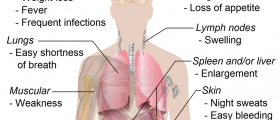
What Are Swollen Inguinal Lymph Nodes?
Lymph nodes are small structures located throughout the body, and which help to filter pathogens and other hazardous foreign substances that invade it. They are an essential part of the immune system. The inguinal lymph nodes are the lymph nodes that drain the areas around the groin, such as the anal canal, skin, and genitals.
Swollen or enlarged inguinal lymph nodes are lumps or bumps which, in case they are big enough, can be palpated (felt) by the patient experiencing them. These swollen lymph nodes can additionally be quite sore or painful, although some patients with swollen lymph nodes have no pain and discomfort at all.
Plenty of patients will be extremely concerned if they notice swollen lumps that they think are lymph nodes, since they first think of cancer as a possible cause of the lumps. Luckily, not every single enlargement of the inguinal lymph nodes points to cancer. These lymph nodes are in charge of the lymphatic drainage of numerous organs in the pelvis and there is a variety of reasons for which they may become enlarged.
Causes of Swollen Inguinal Lymph Nodes
The inguinal lymph nodes are in charge of the lymphatic drainage of the penis, scrotum, vagina, vulva, perineum, and gluteal area as well as the lower abdominal wall and lower anal canal. Generally, there are three basic reasons due to which the inguinal lymph nodes become enlarged. They include infection, injury and tumors. Sometimes, the inguinal lymph nodes are only temporarily enlarged, which is good, since it points to an acute infection. In case they are enlarged for a longer period of time, especially if they grow over time, this can be symptomatic of cancers.
An enlargement of the inguinal lymph nodes is typical for infections. These lymph nodes are classified as reactive lymph nodes, and they generally do not exceed the length of 1 cm. Inguinal lymph nodes may enlarge in response to different sexually transmitted diseases (such as herpes simplex, syphilis, lymphogranuloma venereum, and, so on).
Infections of the legs and feet can also cause enlarged inguinal lymph nodes. This enlargement usually lasts for a certain period of time and eventually subsides as the disease is brought under control by specific medications or runs its natural course. Recurrent inflammation or enlargement of inguinal lymph nodes can result in scarring and some of them may stay enlarged.
As for malignant diseases, the enlargement of inguinal lymph nodes can be caused by primary or secondary tumors. Lymphomas are primary lymph node tumors which can affect every lymph node in the body. Even though inguinal lymph nodes are not the most common place for these tumors to develop, both Hodgkin and non-Hodgkin lymphoma can originate from these lymphatic structures. Metastases in inguinal lymph nodes may originate form a variety of primary tumors.
Doctors will examine patients who present with enlarged lymph nodes, and if they suspect the presence of an infection, patients will be given suitable medications. Depending on the urgency, the exact cause will first be determined or broad spectrum antibiotics will be started immediately.
In case the lymph node enlargement does not go away, a biopsy of the enlarged lymph node is necessary. In this procedure, a small tissue sample will be taken and examined in a lab to determine the cause of the enlargement. A biopsy of enlarged inguinal lymph nodes is also indicated if a doctor suspects the presence of a primary malignant tumor or a spread of the tumor of other localization. A CT scan of the pelvis and an MRI scan can provide medical professionals with good insight prior to the biopsy and may even help in the detection of the primary tumor.
If you believe that your lymph nodes may be enlarged, it is always better to seek timely medical advice instead of worrying about the possible cause without taking any steps. In case of serious conditions, early diagnosis nearly always improves the prognosis, so take action fast. On the other hand, if you have heard that enlarged lymph nodes can indicate cancer, you may worry unnecessarily — in many cases, the cause will be found in a short-term infection that can easily be treated.

















Your thoughts on this
Loading...